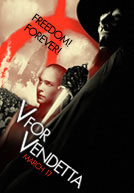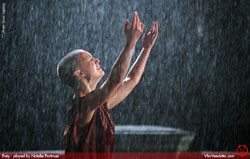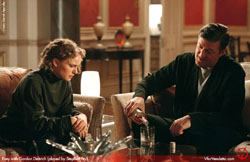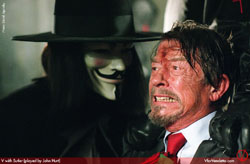
The V for Vendetta graphic novel was as much a part of its time, and a reaction to the government of the era, as George Orwell’s 1984 was. Both predicted a rather bleak, totalitarian future of government control over an apathetic population. Orwell’s predictions have turned out to be frightening accurate, from a right wing ‘socialist’ government, ruling by fear and slogans, the constant surveillance even down to the lotteries. V for Vendetta was written as a reaction to Thatcher’s policies, and at a time when 1984’s world was already becoming a reality.
The movie version of V for Vendetta is realised by the team that brought us that great dystopian, future-shock film, The Matrix. When I first heard the Wachowskis were involved I was not sure if they were a good choice for this very English story, but they have done a commendable job, and despite the reclusive Alan Moore not wanting to have anything to do with it, they have remained reasonably faithful to the graphic novel. This could be mostly due to the involvement of David Lloyd, who drew the original book. In fact there are many scenes that, visually, come straight from the pages. To their credit, the Wachowskis do have great respect for comic artists, employing some of the best to storyboard their films, as well as running their own comic publisher, Burly Man. Unlike some comic book adaptations (Constantine) they did keep it set in its original location (London) and used British actors, apart from the two leads.
 Interestingly, the role of V could have been played by anyone as he is masked throughout the film, much like a certain Vader from another film. In fact it is highly likely that Hugo Weaving did not perform the stunts and fights and the rest of the action did not require much physical input, as a vast percentage of film acting is about the face and the voice. While it was hard not to think of Agent Smith, Weaving did a good job. Natalie Portman, on the other hand, was an interesting choice for the role of Evey, with so many British actresses capable of playing the part and getting the accent right. Samantha Morton, Keira Knightly or even Sinead o’Connor spring to mind immediately, and the first two have box office draw. Taking nothing away from her, Portman was good and played the full range of emotions with great conviction and believability, it was just that accent, which sounded more South African than English. Stephen Fry as Dietrich was another interesting choice although the character he plays is essentially Stephen Fry: an intellectual TV presenter with a love for culture and male companionship. John Hurt is convincingly menacing as Sutler, the government leader, and reminiscent, again, of 1984’s Big Brother.
Interestingly, the role of V could have been played by anyone as he is masked throughout the film, much like a certain Vader from another film. In fact it is highly likely that Hugo Weaving did not perform the stunts and fights and the rest of the action did not require much physical input, as a vast percentage of film acting is about the face and the voice. While it was hard not to think of Agent Smith, Weaving did a good job. Natalie Portman, on the other hand, was an interesting choice for the role of Evey, with so many British actresses capable of playing the part and getting the accent right. Samantha Morton, Keira Knightly or even Sinead o’Connor spring to mind immediately, and the first two have box office draw. Taking nothing away from her, Portman was good and played the full range of emotions with great conviction and believability, it was just that accent, which sounded more South African than English. Stephen Fry as Dietrich was another interesting choice although the character he plays is essentially Stephen Fry: an intellectual TV presenter with a love for culture and male companionship. John Hurt is convincingly menacing as Sutler, the government leader, and reminiscent, again, of 1984’s Big Brother.
 The whole issue of terrorism has brought a lot of controversy to the film, and delays to its release date due to scenes of explosives on a Tube train. Again to the Wachowskis’ credit, they don’t flinch away from controversy or upsetting the status quo. The Matrix opened up a lot of people’s eyes to the possibility that the world isn’t necessarily as we perceive it, and their script and the visuals of this film challenges the viewer to question, which can only be a good thing. There is a good sprinkling of what the establishment call conspiracy theories and what others call the truth, shown through actual newspaper headlines and news footage, which questions who are the real terrorists and proposing that the (fictional) acts of terrorism were instigated by the government to gain new controls over the people. If you subscribe to this view of the world then Adam Curtis’s BBC4 documentary The Power of Nightmares puts forward some very convincing arguments, and the fact that it has been banned in the US does give it some credence. It can be viewed online or downloaded from here.
The whole issue of terrorism has brought a lot of controversy to the film, and delays to its release date due to scenes of explosives on a Tube train. Again to the Wachowskis’ credit, they don’t flinch away from controversy or upsetting the status quo. The Matrix opened up a lot of people’s eyes to the possibility that the world isn’t necessarily as we perceive it, and their script and the visuals of this film challenges the viewer to question, which can only be a good thing. There is a good sprinkling of what the establishment call conspiracy theories and what others call the truth, shown through actual newspaper headlines and news footage, which questions who are the real terrorists and proposing that the (fictional) acts of terrorism were instigated by the government to gain new controls over the people. If you subscribe to this view of the world then Adam Curtis’s BBC4 documentary The Power of Nightmares puts forward some very convincing arguments, and the fact that it has been banned in the US does give it some credence. It can be viewed online or downloaded from here.
 The down side to the film is also the Wachowskis’ script, which, like The Matrix sequels, is over-wordy and commits one of the great sins of writing and filmmaking by telling rather than showing. Having said that, there are some great passages of dialogue that are worth listening to including a great piece of alliteration by V with Vs, but overall it does tend towards the verbose. There are a few scenes and events that are open to questions of logic and continuity, including the now famous head shaving of Miss Portman, which I won’t go into, to avoid giving any spoilers.
The down side to the film is also the Wachowskis’ script, which, like The Matrix sequels, is over-wordy and commits one of the great sins of writing and filmmaking by telling rather than showing. Having said that, there are some great passages of dialogue that are worth listening to including a great piece of alliteration by V with Vs, but overall it does tend towards the verbose. There are a few scenes and events that are open to questions of logic and continuity, including the now famous head shaving of Miss Portman, which I won’t go into, to avoid giving any spoilers.
Despite a general critical roasting, I was pleasantly surprised at how good it was, possibly from going in with low expectations. The long passages of dialogue aside, the film moves along at a good pace, that belies its two-and-a quarter hour running time, and comes to a satisfying conclusion. If you like subversive, anti-establishment films then this is definitely for you and although George Clooney’s films (Syriana, Good Night, and Good Luck, Three Kings) all have important messages, V for Vendetta is very English and glorifies the only guy to ever enter the Houses of Parliament with honest intentions.
